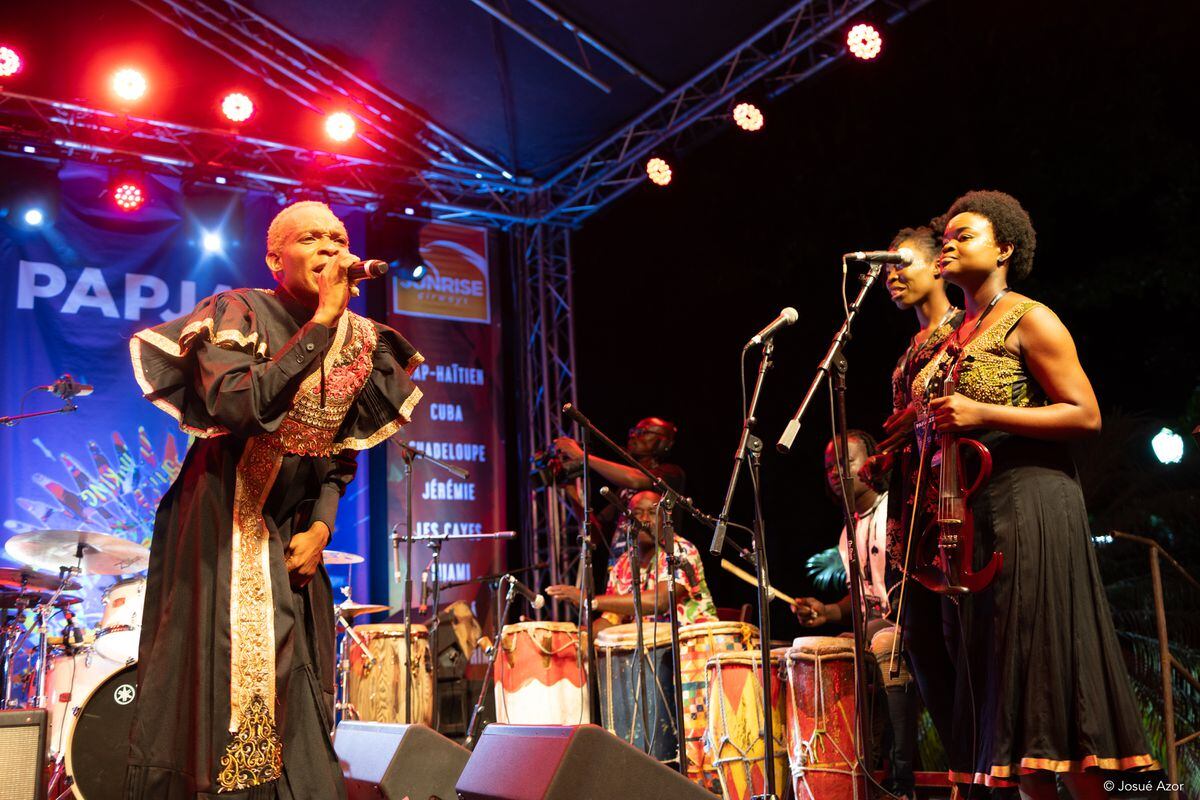EL PAÍS offers the América Futura section openly for its daily and global information contribution on sustainable development.
If you want to support our journalism, subscribe
here
.
Milena Sandler thought a lot about whether to also organize the international PapJazz festival in Haiti this year.
“Not only in Haiti,” she clarifies, “in Port-au-Prince.”
And this city has become the epicenter of violence, kidnappings and the absolute control of the criminal gangs that rule the country since the assassination of President Jovenel Möise, in 2021. But the desire to listen to good music won: “This More than anything, the country needs a little normality, we wanted to give them that.
“This is the festival of resistance to violence.”
The meeting, which has been canceled or moved venues for the last two editions, replaced public spaces with hotels and eight days of concerts with four, but managed to make keyboards and percussion eclipse the instability of a country in ruins.
Haiti's Minister of Culture, Emmelie Prophète, took the opportunity to praise this type of initiative.
“Music has always known how to console and, above all, find the right words to give hope to lost sorrows.
Everyone who conceived the idea of a jazz festival in Haiti gave their best to transform this project into a prestigious and educational event.
They are musical moments that delight and surprise,” she said.
The festival, organized by the Haiti Jazz Foundation with the sponsorship of the Ministry of Culture and Communication, also included workshops for young musicians and children, film screenings and even environmental awareness workshops.
So, despite the insecurity in the country, the 17th edition of the festival took place.
Between January 25 and 28, the country experienced a kind of oasis of sounds brought from a dozen countries around the world.
Cameroon, Mexico, Cuba, Spain, the United States... International jazz flooded the four main stages, the
after hours
and the nightly
jam sessions
to forget for a few days the crisis that is devastating the poorest country in Latin America and the Caribbean.
“I feel like there was such a great energy for it to go well, that not only was it calm and there were no incidents, but it didn't even rain on us.
We were blessed,” says the organizer.
Erol Josué during a presentation.Josué Azor
But this blessing you speak of had a lot to do with the preparation and security measures they took.
The national police, the tourist police and the private security hired by the festival escorted the more than 20 attending bands from the moment they landed until they got back on the plane.
Armored and armed cars and bodyguards for each of the musicians were some of the precautions taken so that violence did not color the four days of the festival.
“It cost us a lot of money, we assumed it, but it was worth it,” says Sandler.
Another of the measures taken was to shorten the duration of an event that is celebrating its seventeenth edition from eight to four days at a particularly difficult time for Haiti: armed gangs sow terror in the streets and for months there have been demonstrations calling for the departure of the Haitian Prime Minister, Ariel Henry, who was left in charge when Möise was killed and who has not fulfilled his duty to hold elections that are three years late.
Haiti is waiting for multinational forces led by Kenya to arrive to help the police stop the violence.
According to the UN, violence skyrocketed in 2023. Last year, homicides doubled compared to the previous year (4,789 violent deaths compared to 2,183) and kidnappings increased by 83%, going from 1,359 to 2,490.
A scenario as terrifying as it is everyday.
Alain Moraille, a prestigious singer better known as JahNesta, does not forget how a couple of years ago they tried to kidnap his father and how they shot one of the singers from his Creole
reggae
band , who was seven months pregnant.
“I remember when he was a child and he played soccer until 10 at night without anything happening.
Now it is impossible,” he says by phone from his city of residence, Miami, the epicenter of the Haitian diaspora in the United States.
Bassist Richard Bona in Port-au-Prince.Josué Azor
Morraile assures that he never thought about not attending this important event for him and his country.
However, five of the confirmed bands decided not to go out of fear.
“I can't make songs of social criticism and say that we are united and then stay with the comforts of my house,” he says.
“It had to be there and the public appreciated it.
I had never seen people so dedicated to my music, it was very powerful.”
For Haitians, music is a vital tool that has always accompanied the political processes of the island.
“Whenever something happens in Haiti, some anthem comes up and starts playing everywhere.
Like it happened with Lem Pa We Soley La (When You Can't See the Sun).”
This was the anthem that accompanied the protests against the Government of Jean-Claude Duvalier and his dynasty, overthrown in 1986. The song Solda Jah, by Morraile, has now become, 20 years after its release, the soundtrack of the current protests.
Their song talks about how “at home, in Haiti, we are at war”: Many of us will fall / This is the price to pay / We trust that we will always remain / It is not evil, it is good that will triumph, says part of your song.
“All Haitians rely on music to say what is happening to us;
what we don't like”, he ditches.
“This time we needed it more than ever.”

